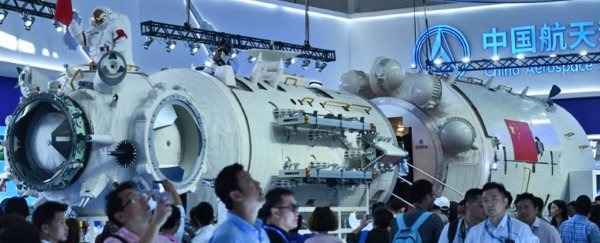The first components of the International Space Station (ISS) launched into space more than 20 years ago, and it's been continuously occupied for 18.
Right now, it's the only operational space station in orbit - but that's about to change.
China just unveiled a life-size replica of the core module of the country's new space station at Airshow China, the largest aerospace exhibition in the country.
The space station program is called Tiangong, which means "Heavenly Palace" in Chinese.
The new ISS competitor's central module is 55 feet (17 metres) long, weighs 60 tons (54 tonnes), and can fit three astronauts.
That's actually quite a bit smaller than the ISS, which is about as large as an American football field if you count its large solar panels.
 (Wang Zhao/AFP/Getty Images)
(Wang Zhao/AFP/Getty Images)
The new space station will allow astronauts to conduct cutting-edge scientific research in the fields of biology and microgravity, according to the Associated Press.
The new station will technically belong to China, but will open its doors to all UN countries. Construction is expected to be completed around 2022.
So far, the world has been most familiar with the Tiangong name thanks to the Tiangong-1 prototype space lab, which crashed into the Pacific earlier this year after authorities lost control of it in orbit two years ago.
This article was originally published by Futurism. Read the original article.
